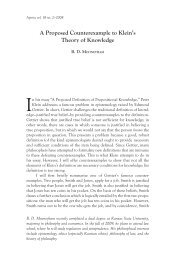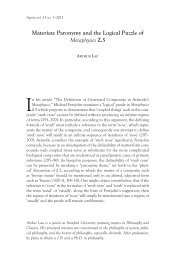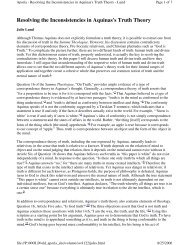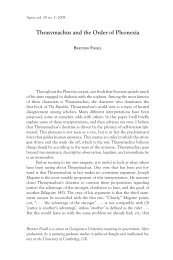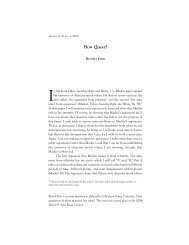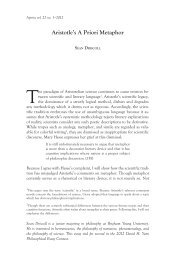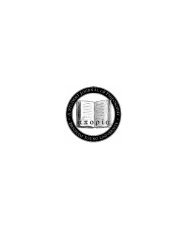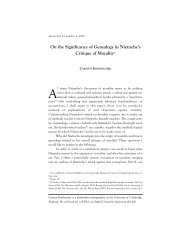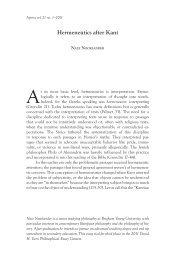Parmenides B6.1â2 without a Modal Fallacy - Aporia - Brigham ...
Parmenides B6.1â2 without a Modal Fallacy - Aporia - Brigham ...
Parmenides B6.1â2 without a Modal Fallacy - Aporia - Brigham ...
You also want an ePaper? Increase the reach of your titles
YUMPU automatically turns print PDFs into web optimized ePapers that Google loves.
8<br />
Michael J. Hansen<br />
the necessary propositions in the Way of Truth), they can at least be reliably<br />
ascertained (thanks to the propositions deduced in the Way of Truth, which<br />
under this interpretation show that what we ascertain is real). Hence, while<br />
there is a difference between knowing what must be and knowing what is<br />
and may not be, on Robinson’s reading the second type of knowledge is not<br />
worthless, as it is on other readings. Moreover, this position helps us make<br />
sense of the goddess’s demand to learn the Way of Opinion and account<br />
for the remarkably useful astronomy that <strong>Parmenides</strong> discovered. Interpretations<br />
that completely deny the usefulness of the Way of Opinion fail to appreciate<br />
one of the greatest scientific observers of an era.<br />
Second, this reading also illuminates <strong>Parmenides</strong>’ historical influence.<br />
Robinson shows that under this interpretation, <strong>Parmenides</strong>’ argument<br />
gives a structural precedent for Plato’s Timaeus 28c–29a (Robinson<br />
628). Here, Plato employs an argument that is analogous in structure to<br />
that of <strong>Parmenides</strong> B6.1–2. Plato examines a disjunction between created<br />
and uncreated paradigms of cosmogony. This is similar to the disjunction<br />
examined by <strong>Parmenides</strong>: what can exist is comparable to the uncreated<br />
paradigm, and what cannot exist is comparable to the created paradigm. In<br />
both instances the second item is ruled out: what is not could not be, and<br />
the cosmos could not be created, given the nature of the forms. Neither<br />
is possible, yet they are used as counterbalances to affirm their complements.<br />
Again, we see <strong>Parmenides</strong> influencing Plato in Republic 476e–480<br />
(Robinson 632). Here, <strong>Parmenides</strong>’ emphasis on the real and what can be<br />
ascertained appears as Plato discusses what constitutes knowledge, and he<br />
does so in strikingly Parmenidean terms. Again, the upshot is analogous:<br />
for <strong>Parmenides</strong>, this premise supports the One, while for Plato it supports<br />
his Forms. This interpretation, then, fits the historical picture well.<br />
In conclusion, it appears that <strong>Parmenides</strong>’ argument doesn’t need<br />
a modal fallacy to remain (otherwise) cogent and compelling. The above<br />
interpretations are strikingly divergent (which is perhaps characteristic<br />
of interpretations of <strong>Parmenides</strong> in general). Lewis can be thought of as<br />
an extension of Owen with a more complete account of <strong>Parmenides</strong>’ argument<br />
by elimination, but both interpretations rely on the modal fallacy to<br />
interpret <strong>Parmenides</strong>. Goldin’s <strong>Parmenides</strong> builds his reality from objects<br />
of thought, whereas Robinson’s <strong>Parmenides</strong> builds his objects of thought<br />
from reality, and both avoid the modal fallacy in reading <strong>Parmenides</strong>. Yet<br />
Goldin fails to preserve <strong>Parmenides</strong>’ larger argument and can’t establish<br />
reasonable historical reactions to his interpretation. If we agree with Robinson’s<br />
translation of B6.1–2, I have shown how one can maintain <strong>Parmenides</strong>’<br />
wider philosophy, particularly his cosmology, as well as his position<br />
in the history of thought, as seen in works of Plato. This reading<br />
of <strong>Parmenides</strong> is as graceful as Owen’s or Lewis’s, and it comes with the<br />
significant bonus of avoiding the fallacy.



